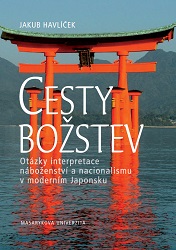Cesty božstev: Otázky interpretace náboženství a nacionalismu v moderním Japonsku
The Paths of Divinity: Topics of Interpretation of Religion and Nationalism in Modern Japan
Author(s): Jakub Havlíček
Subject(s): Politics / Political Sciences, Politics, Social Sciences, Political Theory, Sociology, Theology and Religion, Politics and religion, Nationalism Studies, Sociology of Religion, History of Religion, Politics and Identity
Published by: Masarykova univerzita nakladatelství
Keywords: Ancestor worship; Implicit religions; Japan; Kokugaku; Meiji; Nationalism; Religion; Religions in Japan; Shinto; Shintoism; Sociology of religions; Study of religions; Theory of religions; Theory of social sciences; Yasukuni;
Summary/Abstract: The monograph “Gods’ Ways. Interpreting Religions and Nationalism in Modern Japan” deals with the role of religious phenomena in the process of forming the national identity in modern Japan, with the problem to identify and interpret these phenomena. The introductory chapter is concerned with the issue of defining the theoretical and methodological frame of the thesis. It characterizes the study of religions as a critical social science. Referring to Jonathan Z. Smith, the author deals with the concept of religion as with an analytical category and treats this concept as a social construction originating in the context of Western, Euro-American culture. The thesis is also occupied with the questionof identifying religious phenomena in the context of Japan. It deals with the theories of secularization, with the process of defining religious and secular domains, as well as with the concepts of nation in social sciences. It concerns the subject of implicit religions, finding the theories of implicit religions to be rather vague and inadequate for analyzing religious phenomena in modern Japan. In the conclusion to the chapter, the author proposes the definition of “religion” based on Benson Saler’s concept of tracing “family resemblances” of the phenomena classified as religious. Second chapter deals with the topic of interpreting and systematizing religious phenomena in Japan. It concentrates on the concepts of Shinto and Japanese religion in the works of H. Byron Earhart, Karel Werner, Thomas P. Kasulis, Joseph M. Kitagawa, and Isaiah Ben-Dasan.
- E-ISBN-13: 978-80-210-7721-8
- Page Count: 226
- Publication Year: 2011
- Language: Czech
- eBook-PDF
- Table of Content
- Introduction

